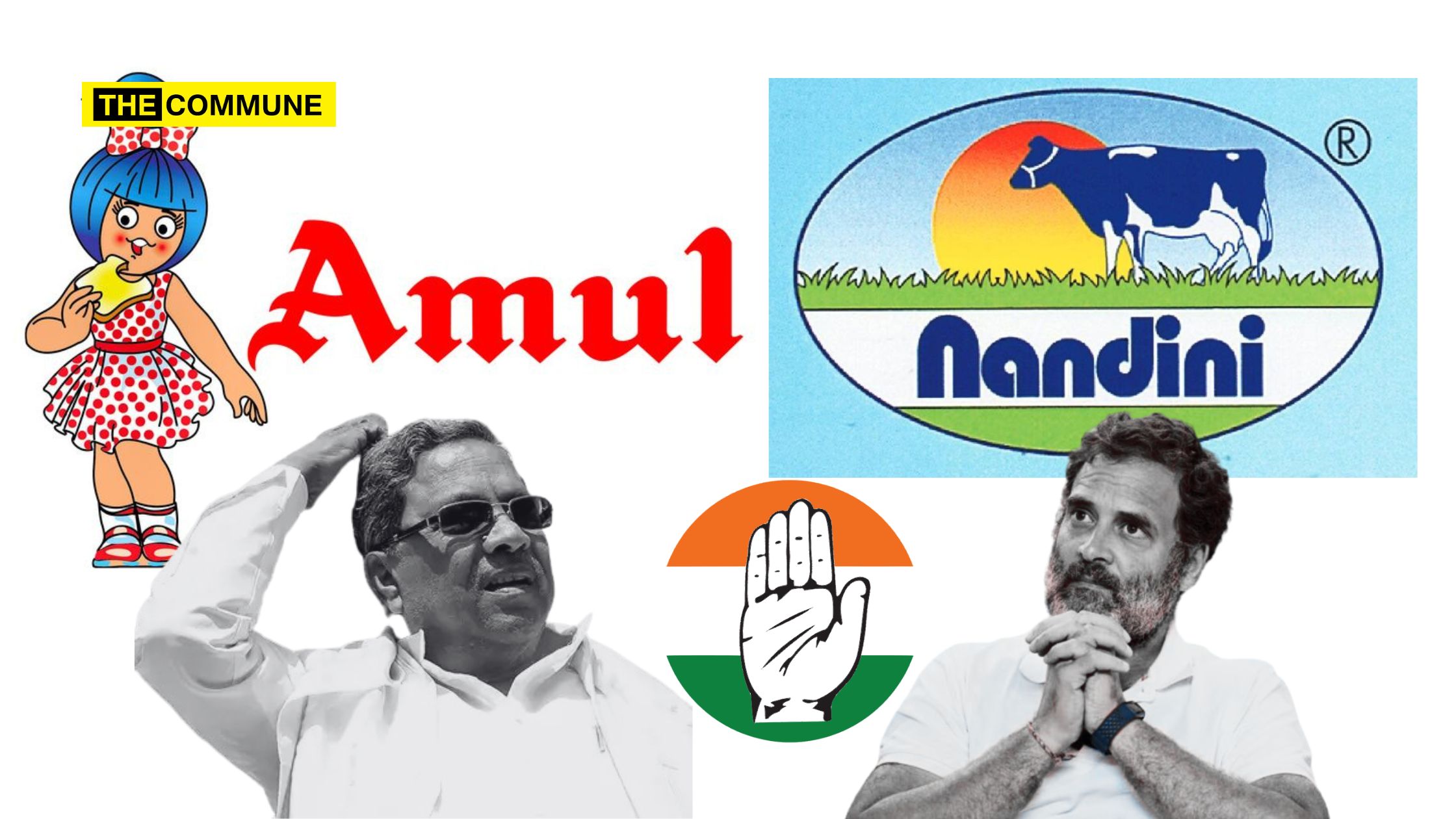
The Karnataka Milk Federation (KMF), under the leadership of Chief Minister Siddaramaiah, is poised to expand its flagship dairy brand Nandini to the national capital, New Delhi. However, the announcement has reignited debates about the Karnataka Congress’s previous opposition to Amul’s entry into the state, sparking allegations of political double standards. This development comes months after a high-profile controversy over Amul’s entry into Karnataka, which saw political parties and cultural groups fiercely opposing the Gujarat-based cooperative’s expansion into the state.
While the Congress-led Karnataka government seeks to expand Nandini’s footprint into new markets, protests against its entry into Kerala have further complicated the narrative, highlighting the intersection of politics, business, and identity in India’s cooperative dairy sector.
Nandini’s Expansion Amid Past Controversy
Nandini’s entry into the competitive North Indian dairy market has been welcomed as a bold business move. The Karnataka government aims to increase the brand’s visibility and market share across India by offering fresh products such as milk and curd in Delhi. Karnataka Milk Federation (KMF) plans to introduce Nandini’s fresh dairy products, such as milk and curd, to the Delhi market. This marks the brand’s first major foray into North India, positioning it in direct competition with the Gujarat Cooperative Milk Marketing Federation’s (GCMMF) Amul brand.
This ambitious plan comes just a year after the Congress-led Karnataka government fiercely opposed Amul’s entry into Karnataka. The opposition turned into a statewide campaign, positioning the issue as a matter of Kannada pride. Congress leaders, including Chief Minister Siddaramaiah and Deputy Chief Minister D.K. Shivakumar, argued that Amul’s expansion would harm Nandini, which they described as an emotional symbol for the people of Karnataka.
At the time, protests led by the Karnataka Rakshana Vedike (KRV), a group promoting Kannada identity, further escalated the controversy. Videos of activists protesting against Amul milk outside stores went viral, with slogans demanding the preservation of Nandini’s dominance in the state. The Congress accused the Bharatiya Janata Party (BJP)-led central government of facilitating Amul’s entry to undermine Karnataka’s dairy industry.
#WATCH | Bengaluru: Karnataka Rakshana Vedike protests to oppose the sale of Amul milk in Karnataka & encourage Nandini products. pic.twitter.com/LQThDsaswY
— ANI (@ANI) April 10, 2023
The same leaders who once decried Amul’s entry into Karnataka as an existential threat to Nandini now advocate for Nandini’s national expansion. Critics have pointed out the apparent double standard, asking whether the same concerns about protecting local brands will apply as Nandini enters new territories. Observers argue that politicizing Amul’s entry in 2023 was a calculated electoral strategy aimed at leveraging Kannadiga pride ahead of the state assembly elections.
The Amul-Nandini Controversy
The roots of the Amul-Nandini row can be traced to a statement made by Union Home Minister Amit Shah in December 2022 during the inauguration of a dairy in Mandya, Karnataka. Let’s take a look at the timeline of the Amul-Nandini controversy:
- December 2022: Union Home Minister Amit Shah, during the inauguration of a Mandya Mega Dairy, suggested collaboration between Amul and Nandini to enhance dairy infrastructure across India. This statement was misinterpreted as a potential merger, sparking fears about Nandini’s independence.
- April 2023: Amul announced plans to introduce fresh dairy products in Bengaluru, prompting protests from Congress leaders and cultural groups like Karnataka Rakshana Vedike (KRV). Campaigns like “Save Nandini” and “Go Back Amul” trended on social media.
- May 2023: Congress, riding on the wave of Kannadiga pride, won the Karnataka Assembly elections. The Nandini-Amul controversy became a focal point of its campaign.
- November 2024: KMF announced plans to expand Nandini into Delhi. Simultaneously, Kerala’s cooperative Milma strongly opposed Nandini’s entry, citing potential harm to local dairy farmers.
Price Wars And Market Dynamics
One of Nandini’s key advantages in Karnataka is its competitive pricing. Nandini’s toned milk, for instance, costs ₹39 per litre in Bengaluru, compared to ₹52 for Amul’s toned milk in Gujarat. Similarly, full-cream milk from Nandini is priced at ₹50 per litre, significantly lower than Amul’s ₹66 per litre. This pricing strategy has helped Nandini maintain a near-monopoly in Karnataka’s dairy market.
Amul, however, clarified that its entry into Karnataka was not intended to compete with Nandini. According to Jayen Mehta, Managing Director of Gujarat Cooperative Milk Marketing Federation (GCMMF), Amul had been selling its products in northern Karnataka since 2015 and had collaborated with Nandini on multiple occasions. Amul ice cream, for instance, is manufactured using milk sourced from Karnataka farmers.
Nandini Faces Resistance In Kerala
As Nandini prepares for its expansion beyond Karnataka, it is noteworthy to remember that in 2023, it had encountered resistance in Kerala. The Kerala State Milk Cooperative Federation, Milma, opposed Nandini’s entry, citing concerns about market disruption.
Milma, the state milk cooperative federation in Kerala, strongly opposed the arrival of Nandini in the state.
Watch the video to know how Rahul Gandhi’s so-called "Mohabbat Ki Dukaan" became poison for Karnataka’s homegrown brand #Nandini pic.twitter.com/U5pZ8UJUGU
— The Pamphlet (@Pamphlet_in) June 30, 2023
Kerala’s CPI(M) government even lodged a complaint with the National Dairy Development Board to address the issue, further complicating Nandini’s plans. Milma’s resistance mirrors the very arguments Karnataka leaders made against Amul’s entry, highlighting how regional politics often supersede cooperative ideals. Ironically, Wayanad was previously represented in Parliament by Congress leader Rahul Gandhi, who had publicly supported Nandini during the Karnataka elections.
While expanding Nandini to other states is a commendable step towards boosting Karnataka’s dairy sector, the Congress’s contradictory stances have fueled criticism. The politicization of the Amul issue in Karnataka, followed by Nandini’s national ambitions, highlights the hypocrisy of the Congress. While Congress used the controversy to consolidate its position in Karnataka, its critics now accuse it of hypocrisy as Nandini expands into other states.
For consumers and farmers, such disputes could have broader implications. Restricting the entry of competing brands limits consumer choice and may hinder farmers from accessing broader markets. Conversely, aggressive expansion strategies could disrupt local economies, as seen in Kerala.
Nandini’s entry and subsequent reception in regions beyond the south will be a litmus test for the cooperative’s long-term vision.
(With inputs from The Pamphlet)
Subscribe to our channels on Telegram, WhatsApp, and Instagram and get the best stories of the day delivered to you personally.




